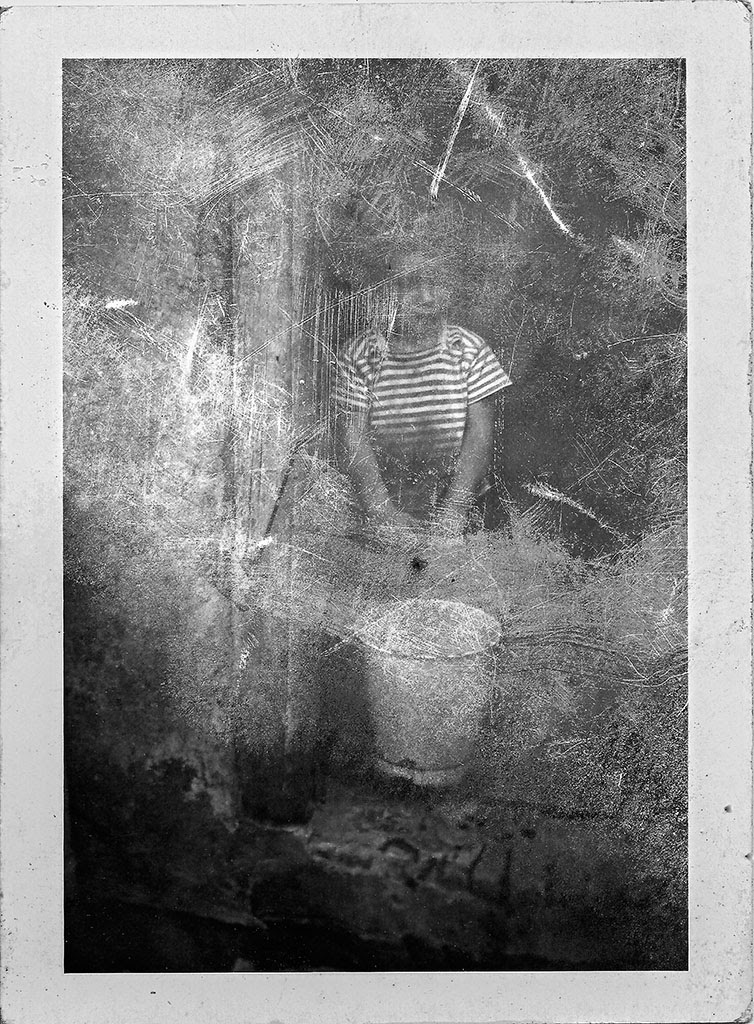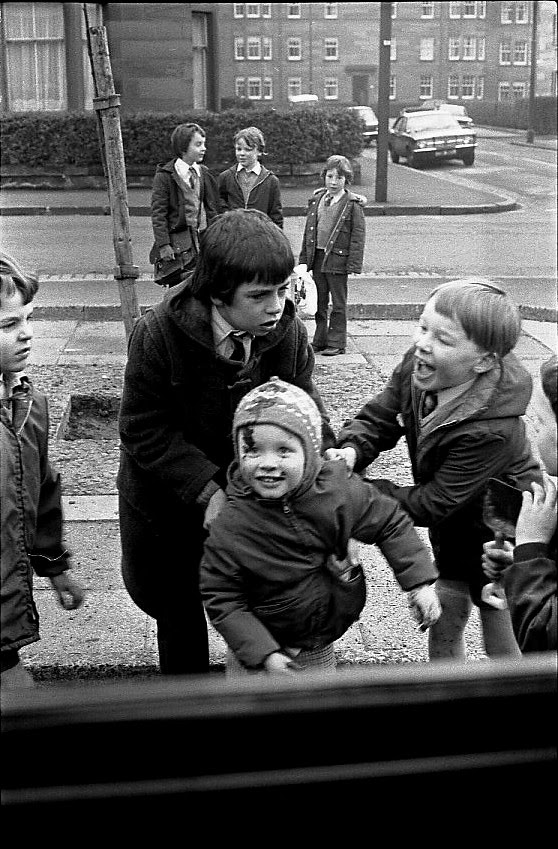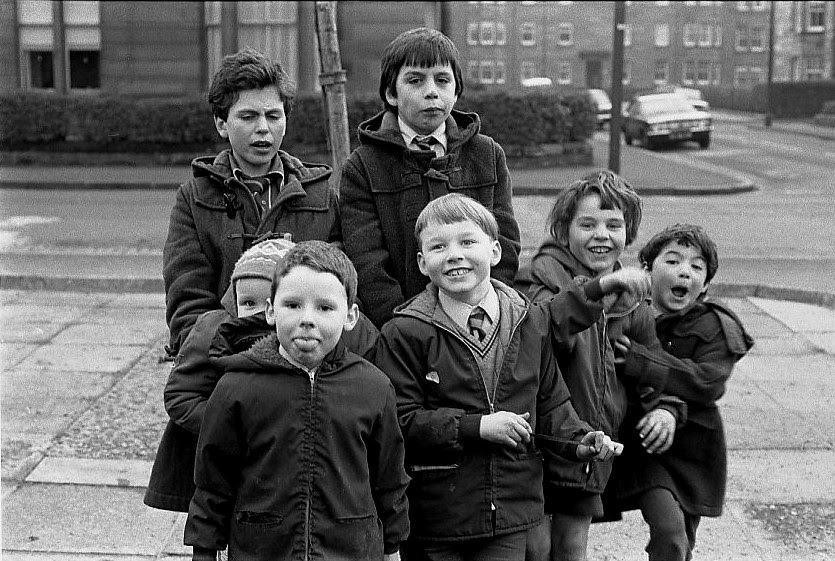.

Dear child of God
With the tears on your face
And your hands clasped in anger
What is the matter with your race?
In the beginning, Father,
You made the terms of our survival
That we should use our intelligence
To kill every rival.
The poison of this ferocity
Runs in our nature,
And O Lord thou knowest
How it nourishes thy creatures.
How it nourishes thy creatures.
Oh what a lively poison it was
To bring to full growth.
Is then becoming loving
As much as our life is worth?
It is a price I would pay
To grow loving and kind,
The price of my life
And the life of human kind.
Father in heaven
Dear Father of peacefulness
It is not often we remember
You put this poison in us,
Generally we stand
With the tears on our face
And our hands clasped in anger,
Faithful but unfortunate.
Florence Margaret "Stevie" Smith (1902-1971): Dear Child of God from Not Waving but Drowning, 1966

Untitled: photo by Malcolm Markovich, 1975

Untitled: photo by Malcolm Markovich, 1975

Untitled: photo by Malcolm Markovich, 1975

Untitled ("Geordie bairns encounter London freaks taking a break on the tour bus"): photo by Malcolm Markovich, 1975

Untitled: photo by Malcolm Markovich, 1975

Untitled ("Is there a story behind this set? did you know these kids?" "Didn't know them, no. Gryphon, the band I was playing with at the time, were touring the UK supporting YES. To the best of my recollection we were in or on the way to/from Newcastle and decided to pull over -- can't recall why. This bunch of kids, just out from school, saw a bunch of freaks in a bus, a camera, and did what kids do."): photo by Malcolm Markovich, 1975

Somewhere in the north of England: photo by Malcolm Markovich, c. 1975



7 comments:
At first when I saw the photographs, I thought (for reasons too personal to go into here), too sad, can't look at this. Then reading the brilliant Stevie Smith poem with its remarkable beginning, middle and ending (it's so great when things come to a definite conclusion you can feel in your bones), I know I will never forget it. I know we all can identify with the second stanza of this poem, but as a lawyer I really do because even the lightest and friendliest work I do is fully in that territory. I'm always amazed when someone on "the other side" of a transaction tries the expression "win/win" out on me, as if I can be taken in by it. People (clients) don't really feel that way. Curtis
It's interesting to consider that this poet, later to spend much of her life in North London, came from Hull, a place not so very far away from or different in look and feel from the Tyneside milieu photographed by Malcolm Markovich (then Malcolm Bennett) while touring with his band in 1975.
Curtis, I'm not sure what it is about the photographs that made you feel too sad.
My reaction was more -- unsettling, unsimulated, real, the species created in the Image of God showing itself as it is.
Oh - the pictures reminded me of a loss (a long time ago) involving a child and sometimes you can't shake an impression. Obviously, neither the photographer nor the kids are responsible. It's in photography's nature to provoke those sorts of feelings. That being said, I had a very nice, out-of-the-blue correspondence this morning with an old friend who lives near Hull. Curtis
Beautiful post. And poem reminds me of those classes in Religion on THE PROBLEM OF EVIL, and where one places the poison. In God or man, in the serpent or Eve, in karma or fate. Or in some kind of Darwinian theology, which gets really creepy. And then there were those classes in church history where the manipulation of the mind and the pocketbook shaped theology. And our thoughts of the divine. As odd as it is, I often see the reflection of those theologies in the simplest explanations friends give for the events of their lives. There must be a reason, so many of my friends say. I wish I agreed sometimes.
Yes, ever since some 500 years or so ago the business sector started putting about the theory that if stepping on the other guy's face makes you a success, it is proof of Divine Providence in action, it's been downhill all the way for smugness and hypocrisy, and an uphill struggle at all times for common sense. But then why did God invent business in the first place, if not to prove that businesspeople are His chosen ones, designated to be snatched directly from their cars on the freeway into That Better Place?
Believe it or no, there lingers in some dusty corners a certain resentment of Stevie for her independence on the subject of religion.
Nin, I suppose your part of the country, along with the South, are the last bastions of this sort of thing, over here.
In these parts, not so much. All anybody wants is a grand piano, a Lamborghini, and Mexicans to do the laundry.
A while ago -- these terminal decades are all a bit of a blur lately, as the shades come down -- but back around the time when I was somehow continuing to subsist in that final ignoble refuge of the blacklisted author, ghost writing, I assisted in the birth of the autobiography of a congenial and personable Christian man from the South, faithfully narrating such memorable historical moments as the meeting with the love of his life on the occasion when she asked him to autograph her thigh -- and I mention this only because the title of the work ultimately produced by this unlikely ghostly collaboration was -- don't you just love these Emily Dickinsonoid tic-dashes? -- Everything Happens for a Reason.
This is theology of the first order. God or no God, there's no solution to the problem of evil.
Bending metrical laws to accommodate the dry, bright force of her thinking.
I'm very glad there was such a thing as Stevie in the world.
Yes -- surely one of the rapidly diminishing number of its brighter features.
Not that her having been in it would have improved her view of the place all that much.
(In this respect among others I believe she distinguished herself from most of the rest of us.)
At least she had sorted the evidence, before drawing conclusions as to where the blame might lie.
(Perhaps useful to an American reader, by the by, to note that, if Stevie were here and reading this poem aloud to us, that concessive final rhyme face/unfortunate, is a rhyme indeed in English, and a quite original and subtle one at that.)
Post a Comment